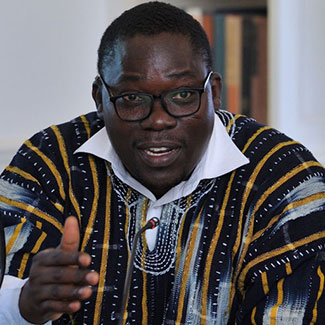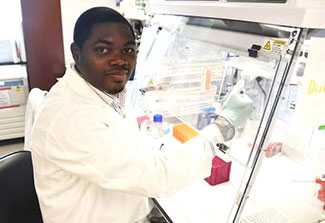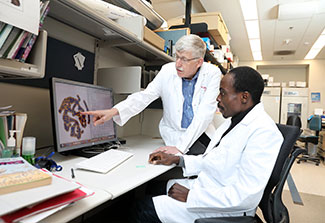Catching up with the first cohort of APTI fellows
September/October 2023 | Volume 22 Number 5
By Mariah Felipe
 Photo credit: Thomas HormenuDr. Thomas Hormenu studied cardiometabolic epidemiology at NIDDK as part of his APTI fellowship.
Photo credit: Thomas HormenuDr. Thomas Hormenu studied cardiometabolic epidemiology at NIDDK as part of his APTI fellowship.
The African Postdoctoral Training Initiative (APTI), established in 2019, prepares future generations of African researchers with four-year fellowships--two years spent in an NIH lab and an additional two years at home institutions in Africa. A partnership between the African Academy of Sciences, NIH and the Bill and Melinda Gates Foundation, the program supports 10 fellows each year. Past and current fellows have come from 14 countries and have been hosted by nine NIH Institutes and Centers. The first cohort is now in their final APTI year. Fogarty caught up with three fellows from that inaugural group to learn more about how the program has impacted their careers and research, and their goals for the future.
Dr. Thomas Hormenu
"My APTI training has empowered me to establish a research center in Ghana to aid in the fight against diabetes and hypertension."—Dr. Thomas Hormenu
A senior lecturer from the University of Cape Coast, Ghana, Dr. Thomas Hormenu received cardiometabolic epidemiology training at the National Institutes of Diabetes and Digestive and Kidney Disease (NIDDK) as an APTI fellow. There he investigated behavioral and psychosocial factors that influence the prevalence of undiagnosed diabetes in Africans living in the U.S. and explored social determinants of cardiometabolic health in African immigrants.
Through this training he developed the skills needed to design cost-effective screening tools for characterizing the etiology of diabetes and obesity phenotypes in populations of African descent. He was also able to develop a research protocol to screen for risk factors associated with undiagnosed diabetes and hypertension and to assess the effect of lifestyle interventions on diabetes remission.
Following his APTI training, Hormenu plans to continue researching the prevalence and risk factors associated with diabetes and hypertension in Ghana and other sub-Saharan African countries. He aims to contribute to the development of culturally sensitive and appropriate interventions for diabetes prevention and remission, ultimately improving the quality of life in these regions, and hopes to create a research center of excellence that bridges the gap in data and knowledge about cardiometabolic diseases in Africa.
 Photo credit: NHLBIDr. Kolapo Oyebola worked in the sickle cell branch at NLHBI as part of his APTI fellowship.
Photo credit: NHLBIDr. Kolapo Oyebola worked in the sickle cell branch at NLHBI as part of his APTI fellowship.
Dr. Kolapo Oyebola
“We have built a research facility for genomics and bioinformatics of genetic disorders of public health concern in sub-Saharan Africa”— Dr. Kolapo Oyebola
A senior researcher at the University of Lagos, Dr. Kolapo Oyebola, had the opportunity to work in the National Heart, Lung, and Blood Institute (NHLBI) sickle cell branch. There he studied a condition called clonal hematopoiesis and how it can impact transplantation in sickle cell disease (SCD) patients. Clonal hematopoiesis is an age-related condition marked by the accumulation of genetically abnormal blood cells. Besides increasing the risk of cancer, the condition contributes to inflammation within atherosclerotic plaques, which is associated with the development of cardiovascular disease.
Now back in Nigeria for the last year of his APTI fellowship, Oyebola established the Centre for Genomic Research in Biomedicine at Mountain Top University, Nigeria. This center focuses on investigating sickle cell disease and other noncommunicable diseases (NCDs) in populations of African descent, particularly looking at the impact of genetically abnormal blood cells on these pathologies in individuals living with SCD .
Following his APTI training, Oyebola will continue his research in genomics and bioinformatics, particularly focusing on understanding the genetic factors underlying NCDs in African populations. He aims to contribute to the development of genetic prognoses and therapeutic interventions for these diseases to reduce their burden in Africa.
 Photo credit: CHIA-CHI/Charlie ChangDr. Idowu Aimola of Nigeria (seated) spent the first two years of his APTI fellowship in the lab of Dr. Francis Collins (standing) at NHGRI.
Photo credit: CHIA-CHI/Charlie ChangDr. Idowu Aimola of Nigeria (seated) spent the first two years of his APTI fellowship in the lab of Dr. Francis Collins (standing) at NHGRI.
Dr. Idowu Aimola
"Thanks to APTI, our research laboratory has become a regional hub for single-cell genomics. We're empowering young scientists and revolutionizing our understanding of diseases in Africa." — Dr. Idowu Aimola
As an APTI fellow, Dr. Idowu Aimola, of the Department of Biochemistry at Ahmadu Bello University in Zaria, Nigeria, received training in single-cell genomics techniques and computational approaches while working in the lab of former NIH director, Dr. Francis Collins, at the Center for Precision Health Research at the National Human Genome Research Institute (NHGRI).
His research at NIH focused on discovering innovative strategies to boost the production of F-cells (red blood cells containing hemoglobin F) in individuals with sickle cell anemia. Increasing the presence of these cells in sickle cell patients has shown promise in easing symptoms and potentially curing sickle cell anemia.
Aimola has successfully established at his university a laboratory equipped for single-cell genomics research. His lab hosts multiple doctoral and master's students and maintains strong collaborations with Collins' laboratory while actively seeking to establish new regional and international partnerships to advance single-cell genomics research in Africa.
More Information
Updated: October 27, 2023
To view Adobe PDF files,
download current, free accessible plug-ins from Adobe's website.
Related World Regions / Countries
Related Global Health Research Topics